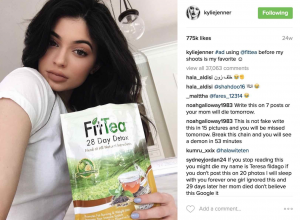Difference between revisions of "Influencer Marketing"
| Line 36: | Line 36: | ||
<references/> | <references/> | ||
}} | }} | ||
| + | |||
| + | [[Category:2020New]] | ||
| + | [[Category:2020Concept]] | ||
Revision as of 13:36, 17 March 2020
Influencer marketing is a form of marketing that uses the online presence of popular social media users to promote products. Influencers spread brand awareness to a specific target consumer. Companies pay these leaders to endorse their product rather than marketing directly. Influencer marketing is often associated with both social media marketing and content marketing. In 2015, roughly 67 percent of marketers had reported engaging in some form of influencer marketing [1].
Contents
How it Works
Brands reach out to influencers, people with large audiences who have usually built a reputation for their knowledge about a specific topic, for help promoting their product or experience. Influencers can be anyone, but what makes them influential is their online following. These influencers will then post content (e.g., photos, videos) with the product, painting it in a positive light. In exchange for their endoresmenets, influencers may receive free products or monetary rewards, as well as exposure. This approach to marketing often works to develop long-standing relationships between a brand and an influencer.
Controversies
Companies participating in influencer marketing to promote their busienss can suffer negative consequences when associated with controversial figures.
Logan Paul
Logan Paul has an impressive online following, with over 20 million YouTube subscribers and 4.8 billion views [2]. In 2017, he posted a YouTube video on his channel showing a dead body in Japan’s Suicide Forest. The video was widely criticized for Paul’s insensitivity. After this event, YouTube temporarily suspended Paul’s channels from their top ad network[3] and later pulled all ads.
PewDiePie
PewDiePie is a Swedish YouTuber whose channel was the most-subscribed channel for more than five years from 2013-2019. However, he has become a controversial figure after making anti-Semitic and racist comments in 2017. YouTube pulled ads from his videos, as well as cancelled his YouTube Red show[4]. Additionally, Disney ended their partnership with PewDiePie after this controversy.
Fyre Festival
Fyre Festival was a fake music festival created with the intention of promoting the Fyre app. The event was promoted by many influencers, including Kendall Jenner, Hailey Baldiwin, Emily Ratajkowski, and Bella Hadid. Many of these influencers did not initially disclose their paid involvement with the event, as required by the Federal Trade Commission. Although the festival ended up being a scam, many influencers filmed promotional videos and even advertised promo codes. However, the experience portrayed by the influencers ended up being far from the reality of the situation, and investors lost $26 million[5].
Ethical Concerns
Inauthentic Endorsements
It is common that influencers do not use, or even like, the products they endorse online. The are obligated to provide positive information about the businesses with whom they are associated, even if this means bending the truth. However, much of influencer marketing is built upon trust and authenticity. Out of the 20,000 women surveyed in a study conducted by Bloglovin, 61% of said they will not engage with an influencer’s sponsored content if it does not feel genuine[6].
By allowing influencers to inaccurately represent their opinions and experiences, social media, and therefore influencer marketing, is harming the importance of honesty and authenticity. People have a difficult time respecting influencer endorsements if there is a chance that the influencer in question is being inauthentic. This topic is discussed by Shannon Vallor, who claims that honesty involves putting one’s authentic self forward, which implies risk[7]. There are general expectations of honesty when it comes to communicating information, and this applies to social media as well.
Improper Disclosure
Along with the rest of the advertising industry, influencer marketing is monitored by the Federal Trade Commission (FTC). The FTC has a set of guidelines and rules that influencer marketing must follow. Influencers must disclose when they have any “financial, employment, personal, or family relationship” with a brand[8], and there are rules outlining how this disclosure must occur. Despite this, one study found that about 93% of influencer social media endorsements do not offer full disclosure[9] as mandated by the FTC.
Although every sponsored post is required to disclose that it is an advertisement, some brands try to cheat the system by hiding the disclosure at the end of a post or within a cluster of hastags. Not all influencers willingly comply with the FTC regulations, which is unfair to followers who may be unaware of an influencer’s association with a brand.
References
- ↑ What Is Influencer Marketing?: Read The Ultimate Guide. 13 Nov. 2019, www.tapinfluence.com/blog-what-is-influencer-marketing/.
- ↑ https://en.wikipedia.org/wiki/Logan_Paul
- ↑ Spangler, Todd. “YouTube Suspends All Ads on Logan Paul's Channels.” Variety, 27 Feb. 2018, variety.com/2018/digital/news/logan-paul-youtube-advertising-suspended-1202693482/.
- ↑ “YouTube Controversies That Shook The Influencer Marketing World.” Mediakix, 28 Feb. 2019, mediakix.com/blog/youtube-controversies-influencer-marketing/.
- ↑ Jr., Tom Huddleston. “Fyre Festival: How a 25-Year-Old Scammed Investors out of $26 Million.” CNBC, CNBC, 22 Aug. 2019, www.cnbc.com/2019/08/18/how-fyre-festivals-organizer-scammed-investors-out-of-26-million.html.
- ↑ Fullerton, Laurie. “61% Of Women Will Not Enage with an Influencer's Sponsored Post until an Emotional Connection Is Established, Survey Says.” The Drum, The Drum, 14 Dec. 2016, www.thedrum.com/news/2016/12/13/61-women-will-not-enage-with-influencers-sponsored-post-until-emotional-connection.
- ↑ Vallor, Shannon. "Social Networking Technologies and the Virtues" 11 August 2009.
- ↑ “Disclosures 101 for Social Media Influencers.” Federal Trade Commission, 7 Nov. 2019, www.ftc.gov/tips-advice/business-center/guidance/disclosures-101-social-media-influencers.
- ↑ “93% Of Top Celebrity Social Endorsements Violate FTC Rules.” Mediakix, 7 Aug. 2019, mediakix.com/blog/celebrity-social-media-endorsements-violate-ftc-instagram/#gs.Obtl7r0.

